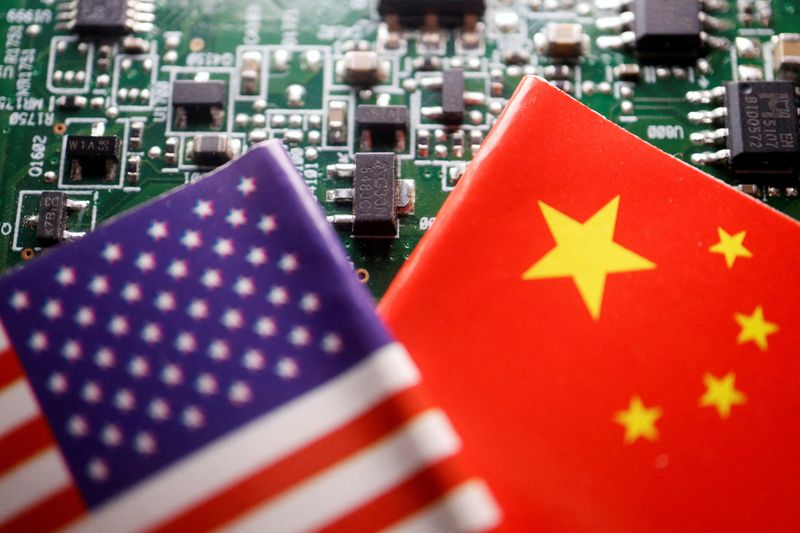By Karen Freifeld and David Shepardson
(Reuters) -The USA on Monday launched its third crackdown in three years on China’s semiconductor trade, curbing exports to 140 corporations together with chip gear maker Naura Know-how Group, amongst different strikes.
The trouble to hobble Beijing’s chipmaking ambitions additionally hits Chinese language chip toolmakers Piotech and SiCarrier Know-how with new export restrictions as a part of the bundle, which additionally takes goal at shipments of superior reminiscence chips and extra chipmaking instruments to China.
The transfer is among the Biden administration’s final large-scale efforts to stymie China’s capability to entry and produce chips that may assist advance synthetic intelligence for army functions, or in any other case threaten U.S. nationwide safety.
It comes simply weeks earlier than the swearing-in of Republican former president Donald Trump, who is predicted to retain lots of Biden’s tough-on-China measures.
The bundle consists of curbs on China-bound shipments of excessive bandwidth reminiscence (HBM) chips, important for high-end functions like AI coaching; new curbs on 24 extra chipmaking instruments and three software program instruments; and new export curbs on chipmaking gear made in international locations resembling Singapore and Malaysia.
Commerce Secretary Gina Raimondo mentioned the motion goals to stop “China from advancing its domestic semiconductor manufacturing system, which it will use to support its military modernization.”
Reuters first reported many corporations concerned and key particulars of the plan.
The instrument controls will probably damage Lam Analysis (NASDAQ:), KLA and Utilized Supplies (NASDAQ:), in addition to non-U.S. corporations like Dutch gear maker ASM Worldwide (AS:).
Amongst Chinese language corporations going through new restrictions are practically two dozen semiconductor corporations, two funding corporations and over 100 chipmaking instrument makers. The businesses embrace Swaysure Know-how Co, SiEn Qingdao, and Shenzhen Pensun Know-how Co, work with China’s Huawei Applied sciences, the telecommunications gear chief as soon as hobbled by U.S. sanctions and now on the heart of China’s superior chip manufacturing and improvement.
They are going to be added to the entity listing, which bars U.S. suppliers from transport to them with out first receiving a particular license.
Requested in regards to the U.S. curbs, Chinese language international ministry spokesman Lin Jian mentioned such behaviour undermined the worldwide financial commerce order and disrupted international provide chains.
China will take measures to safeguard the rights and pursuits of its corporations, he added at an everyday press briefing on Monday.
The Chinese language commerce ministry didn’t instantly reply to a request for remark. China has stepped up its drive to turn out to be self-sufficient within the semiconductor sector in recent times, because the U.S. and different international locations have restricted exports of the superior chips and the instruments to make them. Nonetheless, it stays years behind chip trade leaders like Nvidia (NASDAQ:) in AI chips and chip gear maker ASML (AS:) within the Netherlands.
The U.S. is also poised to put extra restrictions on Semiconductor Manufacturing Worldwide, China’s largest contract chip producer, which was positioned on the Entity Record in 2020 however with a coverage that allowed billions of {dollars} value of licenses to ship items to it to be granted.
For the primary time, the U.S. will add three corporations that make investments in chips to the entity listing. Chinese language non-public fairness agency Sensible (LON:) Street Capital, tech agency Wingtech Know-how Co and JAC Capital due to their position “in aiding China’s government’s efforts to acquire entities with sensitive semiconductor manufacturing capability critical to the defense industrial bases of the United States and its allies with the objective of relocating these entities to China.”
Corporations in search of licenses to ship to corporations on the Entity Record typically get denied.
DUTCH AND JAPANESE EXEMPTED
A side of the brand new bundle that addresses the international direct product rule might damage some U.S. allies by limiting what their corporations can ship to China.
The brand new rule will develop U.S. powers to curb exports of chipmaking gear by U.S., Japanese, and Dutch producers made in different elements of the world to sure chip crops in China.
Gear made in Israel, Malaysia, Singapore, South Korea and Taiwan is topic to the rule whereas Japan and the Netherlands will probably be exempt. The expanded international direct product rule will apply to 16 corporations on the entity listing which can be seen as crucial to China’s most superior chipmaking ambitions.
The rule will even decrease to zero the quantity of U.S. content material that determines when sure international objects are topic to U.S. management. That can enable the U.S. to control any merchandise shipped to China from abroad if it accommodates any U.S. chips.
The brand new guidelines are being launched after prolonged discussions with Japan and the Netherlands, which, together with the US, dominate the manufacturing of superior chipmaking gear. The USA plans to exempt international locations that undertake comparable controls, the folks mentioned.
One other rule within the bundle restricts reminiscence utilized in AI chips that correspond with what is called “HBM 2” and better, know-how made by South Korea’s Samsung and SK Hynix and U.S.-based Micron (NASDAQ:).

Trade sources anticipate solely Samsung Electronics (KS:) to be affected. Analysts estimate Samsung generates about 30% of its HBM chip gross sales from China. The most recent guidelines are the third main bundle of chip-related export curbs on China adopted below the Biden administration.
In October 2022, the US printed a sweeping set of controls on sale and manufacture of sure high-end chips that was thought-about to be the most important shift in its tech coverage towards China for the reason that Nineteen Nineties.




